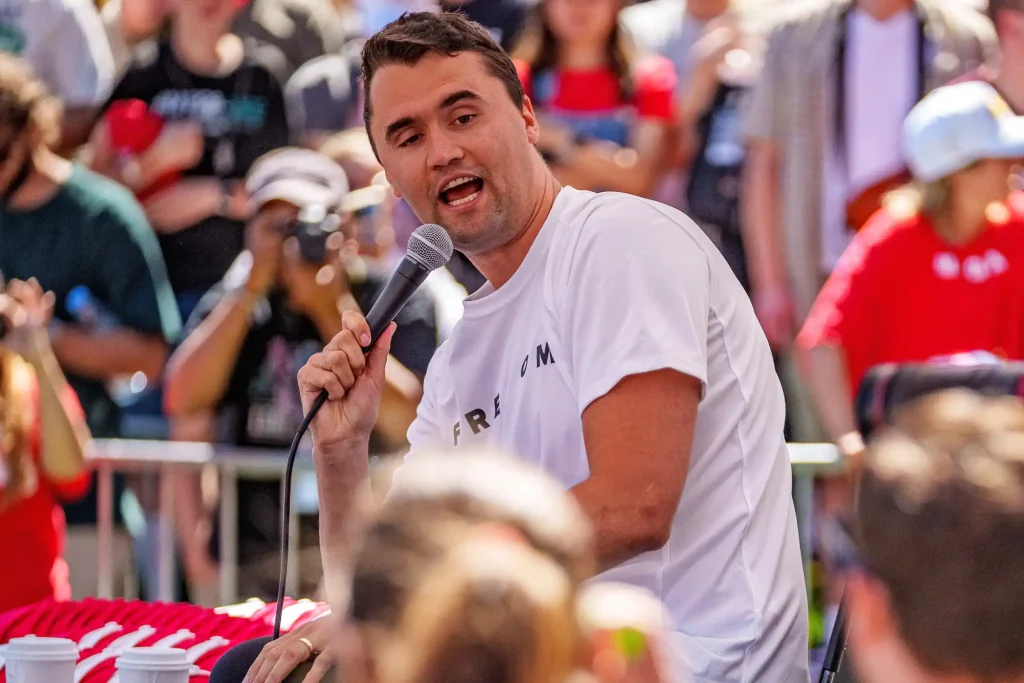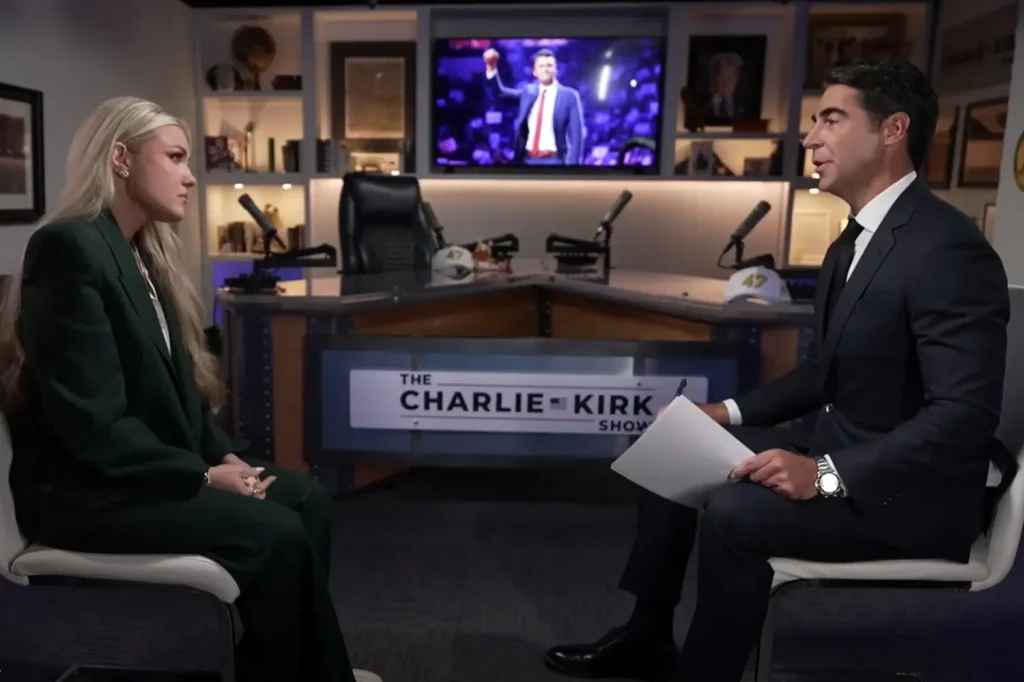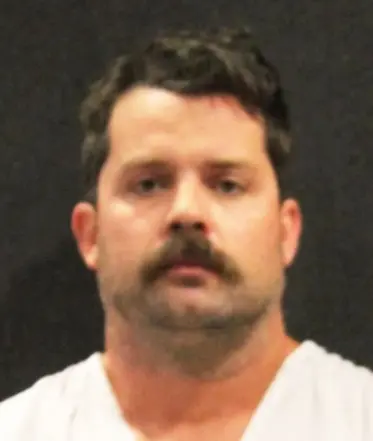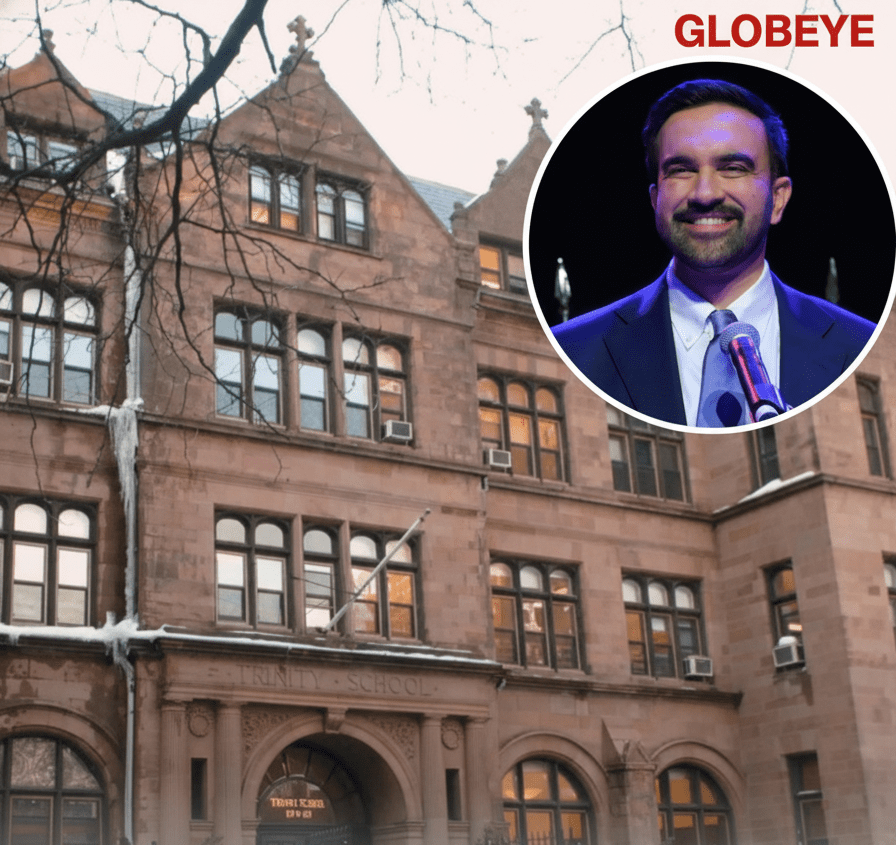Erika Kirk Reveals the Unimaginable Moment She Saw Husband Charlie in the Hospital Right After His Assassination — “He Had This Knowing Half-Smile”
In the cold corridors of the hospital, when the rush of ambulances and flashing lights finally receded, there stood Erika Kirk — wife, mother and the grief-stricken partner of one of America’s most outspoken conservative voices, Charlie Kirk. On September 10, 2025, Charlie Kirk was shot during an event at Turning Point USA’s “American Comeback” tour at Utah Valley University in Orem, Utah. What followed was a night of raw fear, frantic care and unthinkable loss.

Erika’s account — one she told with trembling voice and tear-blurred eyes on national television — fills in fragments of that moment of reckoning. She described entering the hospital room and seeing Charlie’s body, the aftermath of violence etched into its silence. “When we walked into that room … he had this smirk on his face,” she said, wiping away tears. “That smirk … to me is that look of, ‘You thought you could stop what I’ve built.’”
It was in that grim, antiseptic space — far removed from the stage lights, cheering students and podcast microphones — that the magnitude of what had happened truly sank in. Charlie Kirk, a 31-year-old conservative activist, founder of Turning Point USA, and campus regular, was pronounced dead after being shot in the neck during his remarks.
Erika had received the call. She was contacted by the organization’s executives, and arrangements were made for her to travel to Utah. Within hours she was standing by her husband’s side, grappling with the unimaginable. What she witnessed, what she felt, was a moment of confrontation with death — but also of powerful symbolism. “I honestly have no idea what any of this means. I know that God does, but I don’t,” she said publicly days after the event.
They were married in 2021. Erika, born Erika Frantzve, a former Miss Arizona and faith-driven entrepreneur, had become a mother to their two young children and a partner to a man who made his voice his weapon. On that September afternoon, Charlie had traveled to Utah for a campus event — routine for his public persona — yet it turned catastrophic. Less than 20 minutes into his speech, a single bullet ripped through his neck from a rooftop vantage point, according to police reports.

Erika’s recollection of seeing him in hospital is steeped in sorrow, admiration and a set of meanings she was only just beginning to understand. The “smirk” she references has been interpreted as a symbol of resilience, defiance, continuity — and perhaps a reminder to his movement that life is greater than death. But for Erika, the moment was intimate and human. She told of kissing his hand, of staring at the man she loved one last time, and of carrying the weight of a question that no one should face at 31: how do you move on after your partner is taken in that way?
In her public address days later, she stood alone in front of an empty chair — the one Charlie had occupied for his show, the one microphone he had used, the one stage he believed in — and declared: “The movement my husband built will not die… It will not.”
Her words were crisp, direct, yet imbued with grief. Because grief doesn’t always manifest as broken sobs. Sometimes it’s a decision made mid-tears: a decision not to let hate or violence be the final word. In that moment she pledged to step into the role of leader of his organization, as the board confirmed soon after. It was reportedly something Charlie had privately prepared for.
The broader implications of this tragedy cannot be ignored. From the clouds of grief emerged a nation confronted with yet another example of political violence. Within hours of the shooting, the FBI and Utah officials revealed details of an alleged suspect, Tyler Robinson, 22, who faces charges including aggravated murder, and they began assembling a case amid national shock. The attack sent ripples across the political landscape: flags at half-mast, voices from both parties condemning the violence, hundreds of thousands watching the news unfold in disbelief.

For Erika, the landscape changed entirely in a moment. The home she shared with Charlie — for their kids, their church, their ministry — forever shifted. She described conversations with their daughter about why “Daddy didn’t come home,” and nights where the silence echoed louder than the cheers he once enjoyed. According to friends and insiders, Erika is leaning on her faith deeply: she and Charlie had been devout believers, and her spiritual foundation is now what she uses to stand, breathe and move forward.
But moving forward doesn’t mean forgetting. She told the story of finding his cross necklace — the one piece of jewelry Charlie refused to part with — after the chaos and being able to hold it, feel his presence. And she told of looking at his face in the hospital, seeing the half-smile, and knowing, despite the devastation, his mission, his legacy and his voice remained alive. She said: “His eyes were semi-open and he had this knowing, Mona Lisa-like half-smile. Like he’d died happy. Like Jesus rescued him.”
Erika recalled how the sheriff initially discouraged her from viewing the body, given the nature of the wound. Yet she insisted on seeing what they had done to her husband, because how could she lead what remained if she did not bear witness? “With all due respect, I want to see what they did to my husband,” she told the officials. That decision, painful though it was, gave her something the hospital couldn’t erase: the confidence that his end was as peaceful (as possible) and that the fire he had lit would not be extinguished by one bullet.
In that hospital room, grief and purpose collided. In the quiet that followed a roar of violence, a wife confronted a moment no spouse should ever face — and from that moment committed to carving meaning, direction and legacy out of loss. She announced that she would continue the work: the college visits, the youth outreach, the podcast, the books, the organization he founded. Because if she did not, the shot might have appeared to win. Instead, she would show that the mission transcended its founder.
As the nation contemplates the meaning of his death — debates about political rhetoric, campus security, gun laws and the nature of activism swirl — Erika remains centered on what she knows best: family, faith and a platform. She has asked the public to pray, not only for her but for the entire movement around Turning Point USA and the young men and women Charlie believed in. She has asked for unity in the face of violence. She has said the answer to hate must not be hate.
The photograph she described — Charlie lying in the hospital bed, the smirk frozen in time, the white sheets pulled tight, the machines humming — now stands as both a scar and a beacon. It is a symbolic tipping point: the funeral has passed, the arrangements concluded (including a service at State Farm Stadium in Arizona) and the world is still watching how this legacy unfolds.
For Erika, the role ahead is monumental. To raise their children without their father, to lead the organization he built, to live a life rooted in faith under the glare of public scrutiny and the weight of history. But if that hospital smirk represented anything, it was defiance. It was a message, perhaps unintended, that something greater than one man’s life had begun. As she said repeatedly: “The movement will not die.”
In the stillness of that room, between tears and purpose, Erika Kirk found a new identity — not only wife and widow, but torchbearer of a voice silenced far too soon. The hospital lights dimmed, machines unplugged, yet the echo of one man’s mission endures. And now, his partner stands in its light, ready.



